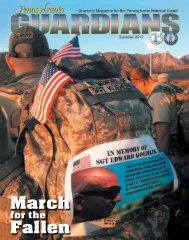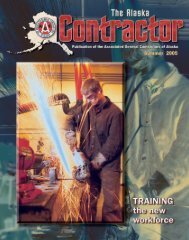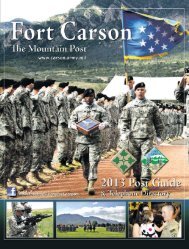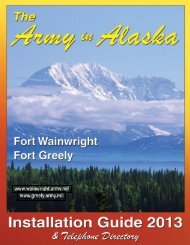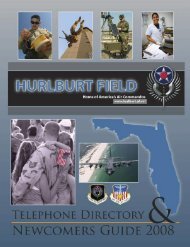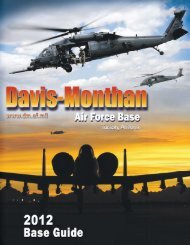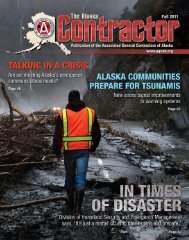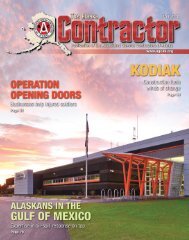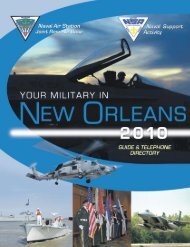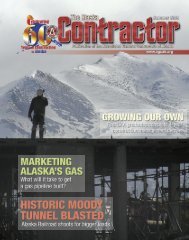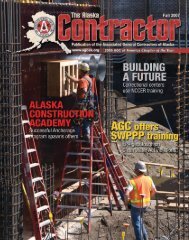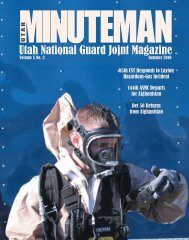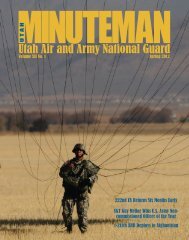The Alaska Contractor: Special 60th Anniversary Issue
The Alaska Contractor: Special 60th Anniversary Issue
The Alaska Contractor: Special 60th Anniversary Issue
You also want an ePaper? Increase the reach of your titles
YUMPU automatically turns print PDFs into web optimized ePapers that Google loves.
PH O TO: LA R RY MO O R E & ASSOCIATES<br />
By Ron Dalby<br />
Rich Richmond, essentially working for the same company with a series<br />
of different owners over the years, made a career out of matching bonding<br />
companies with contractors in <strong>Alaska</strong>. “I was the middleman,”<br />
he said.<br />
At fi rst he worked from Seattle. But in 1974 he was<br />
getting tired of always being on an airplane and spending<br />
his days fl ying back and forth to <strong>Alaska</strong>. He went<br />
home and told his wife and three daughters they were<br />
moving to <strong>Alaska</strong>.<br />
His wife, Sandy, was less than<br />
thrilled with the idea. Born and raised<br />
in Washington, she was quite happy<br />
in Seattle, thank you. Rich prevailed,<br />
though, when he made her understand<br />
that this is how he expected to earn<br />
their livelihood.<br />
It didn’t take long for the reality of<br />
living in <strong>Alaska</strong> in those days to confuse<br />
the issue even more, like the day<br />
his wife went to the grocery store for<br />
some mozzarella cheese and came<br />
home fuming because the store was<br />
out and would be until the next ship<br />
arrived in a week to 10 days.<br />
<strong>The</strong>n there were the constant<br />
power outages. “<strong>The</strong> ships coming into the harbor, said<br />
Richmond, “would drag their anchors and cut the cable<br />
running under the Inlet from the power plant.” Later<br />
a power line built around the Inlet would solve that<br />
problem, but in the meantime Richmond bought an<br />
emergency generator for his home<br />
“I fi nally placated her by buying a condominium in<br />
Maui,” Richmond said. “I wish I hadn’t done that, but<br />
nonetheless we still have it. I haven’t seen it in 17 years,<br />
but she spends a nice piece of every winter over there,<br />
even since we’ve moved back to Washington.”<br />
Bidding jobs<br />
<strong>The</strong> communications problems three decades ago<br />
made for extra excitement in the life of contractors,<br />
according to Richmond. All the bids were opened in<br />
Juneau, and to make certain all materials arrived, contractors<br />
would hand-carry bids to the state capital …<br />
assuming the weather would condescend to let their<br />
Rich Richmond<br />
‘<strong>The</strong> people I<br />
did business with are<br />
really wonderful people’<br />
“<strong>The</strong> AGC<br />
fought tooth<br />
and nail and<br />
fi nally got bid<br />
openings in<br />
Anchorage.<br />
That worked<br />
out a lot better.”<br />
– Rich Richmond<br />
planes land. Bad weather cost a lot of contractors jobs<br />
over the years.<br />
“That’s all past history, now,” Richmond said. “<strong>The</strong><br />
AGC fought tooth and nail and fi nally got bid openings<br />
in Anchorage. That worked out a lot better.”<br />
Younger contractors these days who had no experience<br />
in <strong>Alaska</strong> back then sometimes<br />
don’t quite understand the problems<br />
involved. “Earlier [the day of his interview]<br />
we had been talking about using<br />
a telex,” Richmond said, “when a certain<br />
party mentioned, ‘Well, why didn’t they<br />
just send a fax?’ <strong>The</strong>re weren’t any faxes<br />
and there were no computers and the<br />
ticker-tape telex we had sitting in our<br />
offi ce was our communications link<br />
when it wasn’t down.”<br />
Time zone differences were another<br />
problem. In 1974, Anchorage was two<br />
hours earlier than Seattle, fi ve hours<br />
earlier than the East Coast where many<br />
of the bonding companies were, and Juneau<br />
operated on Seattle time. “A lot of<br />
mornings I was up at four or fi ve in the morning trying<br />
to clear bonds for contractors who decided they needed<br />
one that day.”<br />
People make the difference<br />
“First of all,” Richmond said, “the people I did business<br />
with are really wonderful people. <strong>The</strong>y’re a great<br />
bunch. <strong>The</strong>re were very few accountants up here at the<br />
time and there were a couple of very good bankers.<br />
“<strong>The</strong>re was Bill Murray who worked for Dan Cuddy<br />
[First National Bank <strong>Alaska</strong>]. <strong>The</strong>se people—and Elmer<br />
Rasmuson [National Bank of <strong>Alaska</strong>] of course—were<br />
the two primary bankers along with Al Swalling.” Swalling<br />
was both chairman of the board of Matanuska Bank<br />
and a contractor.<br />
“<strong>The</strong>se people worked on trust. <strong>The</strong>y didn’t bank fi nancial<br />
statements as such, they banked people. If you could get<br />
through an interview with Dan Cuddy or Elmer Rasmuson,<br />
you had a loan. If you couldn’t get through it, forget it.<br />
42 <strong>The</strong> <strong>Alaska</strong> conTrAcTor <strong>60th</strong> <strong>Anniversary</strong> <strong>Issue</strong> 1948–2008



